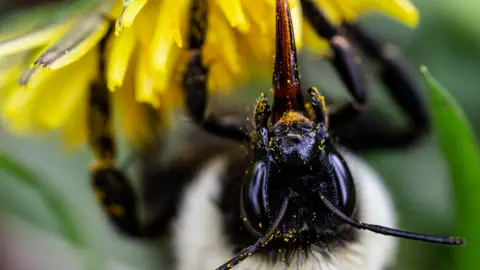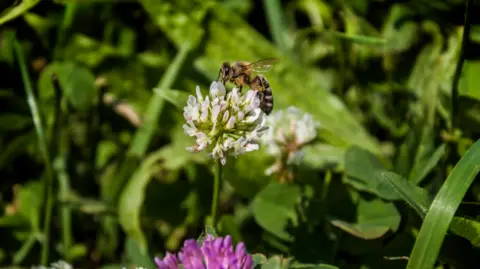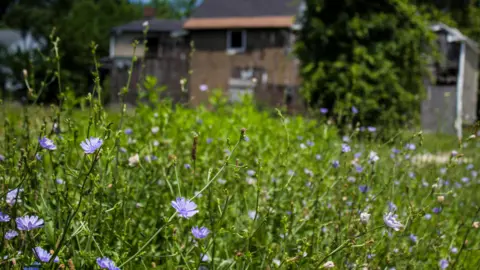Flowers on ex-industrial sites 'harming bees'
 Sarah Scott
Sarah ScottWildflowers growing on brownfield former industrial land could damage the health of pollinators like bees, say researchers.
A University of Cambridge study found brownfield soil could accumulate lead, arsenic and metal contaminants.
It said metals had already been shown to damage the health of pollinators, which ingest them in nectar as they feed, leading to reduced population sizes and death.
Report author Dr Sarah Scott said the results should not stop people from planting wildflowers, and they wanted to raise awareness of the importance of soil health for bees.
 Sarah Scott
Sarah ScottResearchers said common plants like white clover, bindweed, wild carrot and chicory plant were all vital forage for pollinators in cities, but they could accumulate arsenic, cadmium, chromium and lead from contaminated soils.
The metals typically increased with the age of a city and came from different sources including cement dust and mining.
Research was carried out in the US city of Cleveland, Ohio.
The report advised that testing of soils should take place before sowing wildflowers on ex-industrial land.
In areas where species self-seed, regular mowing could stop wildflowers growing and thus reduce the risk of polluted nectar being ingested by insects.
Dr Scott, from the university's Department of Zoology, said: "It's really important to have wildflowers as a food source for the bees, and our results should not discourage people from planting wildflowers in towns and cities.
"We hope this study will raise awareness that soil health is also important for bee health.
"Before planting wildflowers in urban areas to attract bees and other pollinators, it's important to consider the history of the land and what might be in the soil – and if necessary find out whether there's a local soil testing and cleanup service available first."
 Sarah Scott
Sarah ScottThe study, published in the Ecology and Evolution journal, said there was evidence wild pollinator populations had dropped by more than 50% in the last 50 years.
It said this was caused primarily by changes in land use and management across the globe as well as climate change and pesticide use.
Dr Scott said: "Climate change feels so overwhelming, but simply planting flowers in certain areas can help towards conserving pollinators, which is a realistic way for people to make a positive impact on the environment."
Follow Cambridgeshire news on BBC Sounds, Facebook, Instagram and X.
